- Home
- H A CULLEY
THE POWER AND THE GLORY: Kings of Northumbria Book 4
THE POWER AND THE GLORY: Kings of Northumbria Book 4 Read online
THE POWER AND THE GLORY
By
H A Culley
Book four about the Anglo-Saxon Kings of Northumbria
Published by Orchard House Publishing
First Kindle Edition 2017
Text copyright © 2017 H A Culley
The author asserts the moral right under the Copyright, Designs and Patents Act 1988 to be identified as the author of this work.
All Rights Reserved. This book may not be reproduced in any form, in whole or in part, without written permission from the author.
Cover Image: © Sergiyi Patalakha| Dreamstime.com
Table of Contents
List of Principal Characters
Place Names
Glossary
SYNOPSIS OF THE FIRST THREE BOOKS
CHAPTER ONE – THE STAGE IS SET
CHAPTER TWO – THE BATTLE SHIRKER
CHAPTER THREE – PEACE AND WAR
CHAPTER FOUR – INTO THE LAND OF THE PICTS
CHAPTER FIVE – MERCIA RESURGENT
CHAPTER SIX – THE PLAGUE OF JUSTINIAN
CHAPTER SEVEN – PEACE AND RECONCILIATION
CHAPTER EIGHT – STRATHCLYDE
CHAPTER NINE – THE BATTLE OF LOCH KATRINE
CHAPTER TEN – THE SUBJUGATION OF DALRIADA
CHAPTER ELEVEN – THE SYNOD OF WHITBY
CHAPTER TWELVE – ALCFRITH’S REVOLT
CHAPTER THIRTEEN – THE FALL OF ARDEWR
CHAPTER FOURTEEN – THE RETURN OF WILFRID
CHAPTER FIFTEEN – BROTHER AGAINST BROTHER
Author’s Note
Other Novels by H A Culley
About The Author
List of Principal Characters
(In alphabetical order)
Historical characters are shown in bold type
Alchfrith – Oswiu’s son by Rhieinmelth. Sub-king of Deira 655-664.
(NOTE: Spelt Ehlfrith in earlier books but changed to the alternative spelling of Alchfrith in this book to save confusion with his brother Ecgfrith)
Aldfrith – Oswui’s eldest son (illegitimate)
Aldhun – Member of Oswiu’s gesith, later its leader
Alaric – Catinus’ elder son
Alweo – Son of Eowa and nephew of the late King Penda of Mercia
Ælfflaed – Oswiu’s daughter by Eanflæd. Later Abbess of Whitby
Ælfwine – Oswiu’s younger son by Eanflæd. Later Sub-king of Deira
Bruide – Son of the King of Prydenn and later High King of the Picts
Beornheth - Cuthbert’s younger brother and heir presumptive to the Eorldom of Dùn Barra
Cadafael – King of Gwynedd (North Wales)
Cadwalladr – King of Gwynedd after Cadafael
Catinus – Briton born in Mercia who became Ealdorman of Bebbanburg
Ceadda – Oswiu’s hereræswa (army commander), later an ealdorman
Chad – Monk at Lindisfarne, later Bishop of Northumbria in competition with Wilfrid
Colman – Bishop and Abbot of Lindisfarne after Finan
Conomultus – Catinus’ younger brother, chaplain to Oswiu
Cuthbert – A member of Oswiu’s gesith, later Prior then Bishop of Lindisfarne
Domangart – King of Dalriada until 660
Domnall Dhu– King of Dalriada after Domangart
Drest – High King of the Picts after Garnait
Eadstan – Leader of the garrison at Bebbanburg, later the captain of Catinus’ gesith
Eanflæd – Oswiu’s second wife. Daughter of his uncle, Edwin of Northumbria
Eata – Novice at Lindisfarne, later Abbot of Melrose, then of Lindisfarne
Ecgfrith – Oswiu’s son by Eanflæd. Sub-king of Deira 664 – 670
Elfin – King of Strathclyde after Guret and Mermin
Ethelred – Penda’s third son. Later King of Mercia. Also spelt Æthelred in some sources
Finan – Bishop and Abbot of Lindisfarne
Fergus – King of Ardewr and Ròidh’s younger brother
Garnait – High King of the Picts after Talorgan
Guret - King of Strathclyde
Hereswith – Catinus’ daughter, later wife of Alweo
Kyneburga – Daughter of Penda of Mercia and wife of Alchfrith
Leoflaed – Wife of Catinus and mother Hereswith, Alric and Osfrid
Leofric – Catinus’ body slave
Lethlobar – Son of Eochaid, King of the Ulaidh in Ulster
Mael Duin – King of Dalriada after his brother, Domnall Dhu
Morleo – King of Ardewr after Fergus
Osfrid – Catinus’ younger son
Osthryth – Oswiu’s daughter by Eanflæd. Later married King Ethelred of Mercia
Oswiu – King of Northumbria and Bretwalda
Redwald – Hereræswa after Ceadda
Rægenhere – Wilfrid’s younger brother and chaplain to Alchfrith
Ruaidhrí – The bastard son of King Eochaid of the Ulaidh and half-brother of Lethlobar
Talorgan – Oswiu’s nephew. High King of the Picts
Tuda – Bishop of Lindisfarne after Colman
Wigmund – Alweo’s cousin. Prior of Whitby
Wilfrid - Abbot of Ripon. Later Bishop of Northumbria, initially in competition with Chad
Wulfhere – Penda’s second son, later King of Mercia
Utta – Former warrior in Eaochaid’s gesith, later chaplain to Oswiu and then Bishop of Prydenn
Place Names
(In alphabetical order)
I find that always using the correct place name for the particular period in time may be authentic but it is annoying to have to continually search for the modern name if you want to know the whereabouts of the place in relation to other places in the story. However, using the ancient name adds to the authenticity of the tale. I have therefore compromised by using the modern name for places, geographical features and islands, except where the ancient name is relatively well known, at least to those interested in the period, or else is relatively similar to the modern name. The ancient names used are listed below:
Austrasia – A part of Frankia (see below) centred on the Meuse, Middle Rhine and the Moselle rivers, with a coastline opposite that of southern Kent
Bebbanburg – Bamburgh, Northumberland, North East England
Bernicia – The modern counties of Northumberland, Durham, Tyne & Wear and Cleveland in the North East of England. At times Goddodin was a subsidiary part of Bernicia
Berwic – Berwick upon Tweed, Northumberland, North East England
Caerlleon – Chester, Cheshire, England
Caer Luel – Carlisle, Cumbria, England
Caledonia - Scotland
Cantwareburg – Canterbury, Kent, England
Dalriada – Much of Argyll and the Inner Hebrides
Deira – Most of North Yorkshire and northern Humberside
Dùn Add – Dunadd, near Kilmartin, Argyll, Scotland. Capital of Dalriada
Dùn Barra - Dunbar, Scotland
Dùn Breatainn - Literally Fortress of the Britons. Dumbarton, Scotland
Dùn Dè – Dundee, Tayside, Scotland
Dùn Èideann - Edinburgh
Dùn Phris - Dumfries, south-west Scotland
Eoforwīc - York
Elmet – West Yorkshire
Frankia – The territories inhabited and ruled by the Franks, a confederation of West Germanic tribes, approximating to present day France and a large part of Germany.
German Ocean – North Sea
Gleawecastre – Gloucester, England
Goddodin (later Lothian) – The area between the River Tweed and the Firth of Forth; i
.e. the modern regions of Lothian and Borders in Scotland
Gwynedd – North Wales including Anglesey
Kinneddar – Lossiemouth, Moray, Scotland
Loidis – Leeds, Yorkshire
Lundenwic – London
Maserfield – Oswestry in Shropshire
Medeshamstede – Peterborough in Cambridgeshire
Mercia – Roughly the present day Midlands of England
Neustria - The region of Frankia between Aquitaine and the English Channel, i.e. the north of present-day France
Northumbria – Comprised Bernicia, Elmet and Deira. At times it also included Rheged and Goddodin (Lothian)
Orcades – The Orkney Islands, Scotland
Pictland – The confederation of kingdoms including Shetland, the Orkneys, the Outer Hebrides, Skye and the Scottish Highlands north of a line running roughly from Skye to the Firth of Forth; made up at this time of seven kingdoms
River Sabrina – River Severn
River Twaid – The river Tweed, which flows west from Berwick through northern Northumberland and the Scottish Borders.
Rheged - A kingdom of the Ancient Britons speaking Cumbric, a Brythonic language similar to Old Welsh, which roughly encompassed modern Lancashire, Cumbria in England and, at times, part of Galloway in Scotland
Strathclyde – South east Scotland
Yr Wyddfa – Mount Snowdon, North Wales
Glossary
Ætheling – Literally ‘throne-worthy. An Anglo-Saxon prince.
Birlinn – A wooden ship similar to the later Scottish galleys. Usually with a single mast and square rigged sail, they could also be propelled by oars with one man to each oar
Brenin – The Brythonic term by which kings were addressed Wales, Strathclyde and the Land of the Picts
Bretwalda - In Anglo-Saxon England, an overlord or paramount king accepted by other kings as their leader
Ceorl - Freemen who worked the land or else provided a service or trade such as metal working, carpentry, weaving etc. They ranked between thegns and villeins and provided the fyrd in time of war
Currach - A boat, sometimes quite large, with a wooden frame over which animal hides are stretched and greased to make them waterproof
Custos – A guardian or custodian, the word was used in a variety of contexts including to mean one left in charge in the absence of the lord or king
Cymru - Wales
Cyning – Old English for king and the term by which they were normally addressed.
Ealdorman – A rank of noble that came into use at this period. A high-ranking royal official and chief magistrate of an Anglo-Saxon shire or group of shires. He also commanded the army of the shire on behalf of the king. He ranked between an eorl (later earl) and a thegn
Eorl – A noble originally ranking between thegn and members of the royal house. In the seventh century it meant the governor of a division of the kingdom. Later replaced by ealdorman, the chief magistrate and war leader of a county, and earl, the ruler of a province under the King of All England; for example, Wessex, Mercia and Northumbria
Gesith – The companions of a king, usually acting as his bodyguard
Hereræswa – Military commander or general. The man who commanded the army of a nation under the king.
Mormaer – Literally great steward, title accorded to a sub-king or ruler of a province in Scotland; equivalent of an earl or eorl.
Seax – A bladed weapon somewhere in size between a dagger and a sword. Mainly used for close-quarter fighting where a sword would be too long and unwieldy.
Thegn – The lowest rank of noble. A man who held a certain amount of land direct from the king or from a senior nobleman, ranking between an ordinary freeman and an eorl/ealdorman.
Ulaidh - A confederation of dynastic-groupings that inhabited a provincial kingdom in Ulster (north-eastern Ireland) and was ruled by the Rí Ulad or King of the Ulaidh. The two main tribes of the Ulaidh were the Dál nAraidi and the Dál Fiatach
Uí Néill – An Irish clan who claimed descent from Niall Noigiallach (Niall of the Nine Hostages), a historical King of Tara who died about 405 AD
Settlement – Any grouping of residential buildings, usually around the king’s or lord’s hall. In 7th century England the term city, town or village had not yet come into general use
Síþwíf - My lady in Old English. The term used to address a queen
Weregeld – In Anglo-Saxon England, if property was stolen, or someone was injured or killed, the guilty person would have to pay weregeld as restitution to the victim's family or to the owner of the property
Witan – Members of the witenagemot, the council of an Anglo-Saxon king. Usually it included the eorls and the chief priests (bishops and abbots in the case of a Christian kingdom) and, later, the ealdormen, but for the selection of a king or other important matters, it might be expanded to include the more minor nobility, such as the thegns
Villein - A peasant (tenant farmer) who was legally tied to his vill
Vill - A thegn’s holding or similar area of land in Anglo-Saxon England which might otherwise be described as a parish or manor
SYNOPSIS OF THE FIRST THREE BOOKS
WHITEBLADE, WARRIORS OF THE NORTH & BRETWALDA
Woken in the middle of the night to flee the fortress of Bebbanburg on the Northumbrian coast, the twelve year old Prince Oswald escapes his father’s killer, Edwin, to establish a new life for himself on the West Coast of Scotland. He becomes a staunch Christian on Iona and trains to be a warrior.
He makes a name for himself in the frequent wars in Ulster and in a divided Scotland, earning himself the nickname of ‘Whiteblade’ and establishing himself as the greatest war leader in his adopted homeland. However, he is beset by enemies on all sides and is betrayed by those he should have been able to trust the most.
After playing a leading role in deposing the treacherous Connad, King of Dalriada, he helps his successor to extend Dalriada to include the Isles of Skye, Arran and Bute. When King Edwin is killed in battle and those who try to succeed him are also killed by Cadwallon and his invading Welsh army, Oswald decided that his moment of destiny has arrived; he sets out with his brother, Oswiu, and his warriors to confront Cadwallon and win back Northumbria.
Once secure on his throne, he enlists the aid of his friend Aidan to convert his pagan subjects to Christianity and establishes the monastery on the Holy Island of Lindisfarne that will become the focus for the spread of the faith throughout the north of England.
Oswiu marries the heiress of Rheged and becomes its king. Gradually he overcomes the ancient enemies of Rheged and allies himself to them to become the dominant force in Caledonia (Scotland) as well as North West England.
Meanwhile Oswald uses a mixture of force, diplomacy and threat to become the most powerful ruler in the whole of England. However, his enemies lurk in the wings and he is betrayed by his allies and killed in battle by the pagan King of Mercia.
After Oswald is killed and his corpse dismembered, Oswiu rides deep into enemy territory to recover his brother’s body. Despite his efforts to keep it together, the Kingdom of Northumbria is split into two but Oswiu vows to reunite it.
However, he is forced to concentrate on securing his northern border first. Once he becomes overlord of the North he fends off an invasion by Penda, the powerful pagan King of Mercia, before he resorts to underhand tactics to kill his cousin, the King of Deira, and unite Northumbria once more.
Having overcome rebellion by the Picts and another invasion by the Mercians he survives, only to be betrayed by his nephew who he had raised up to be King of Deira. Matters come to a head at the Battle of the Winwaed where he must win or see Northumbria torn apart once more. Against all the odds he prevails and Penda is slain. Oswiu is now Bretwalda of England as well as overlord of Caledonia (Scotland). His greatest challenge will now be to hold his vast realm together
CHAPTER ONE – THE STAGE IS SET
656 AD
Bedwyr sat on his pony just
below the skyline and watched the column wend its way along the valley path below him. The air had that clean feel to it that only comes just after recent rain has washed the dust out of it. The moderate breeze blew his long, matted hair across his eyes and he impatiently brushed it away.
He was only a boy and he wasn’t very good at estimating numbers, but even he realised that there must be at least a thousand, maybe even fifteen hundred, men on the move, mainly warriors with quite a few boys and servants leading packhorses loaded with supplies. He headed around the side of the hill so as to remain in shadow from anyone who happened to glance up. He sniffed at the change in the air and glanced up at the crag above him. Birds flew in and out of cracks in the short pitch of vertical rock which was streaked with guano. That explained the acrid tang in his nostrils.
He rode on, glad to be away from the stench. Once out of sight he started back through the hills to where Cadwalladr currently had his base. He was so excited by what he’d seen that he failed to watch his surroundings as carefully as he should have done. He had entered a shallow valley before he noticed the six riders below him. He saw with alarm that they weren’t men he knew; in all probability they were scouts from the army he’d seen.
He pulled his pony to a halt, then yanked her protesting head around to head off up the side of the valley to the north. Initially he left the startled scouts behind but, once they’d collected their wits, they started up the slope to try and intercept him.
They too were mounted on sure-footed mountain ponies, but larger and more powerful beasts than Bedwyr’s. However, this advantage was somewhat negated by the heavier weight of their riders; all except one. He was no more than fourteen and therefore only two years older than the boy they were chasing. His pony drew ahead of the others and, as their quarry darted a look over his shoulder, it was obvious that the leading scout would overtake him before he was able to reach the ridge up ahead.

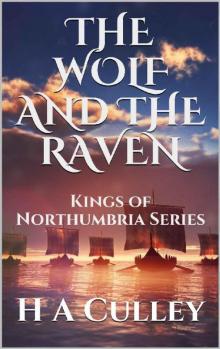 The Wolf and the Raven
The Wolf and the Raven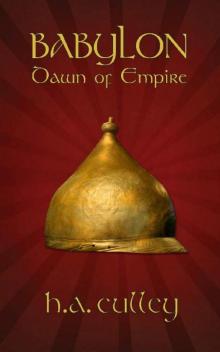 Dawn of Empire
Dawn of Empire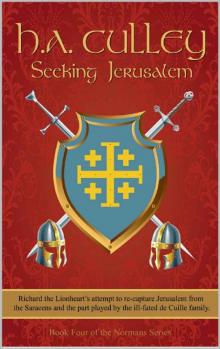 Seeking Jerusalem
Seeking Jerusalem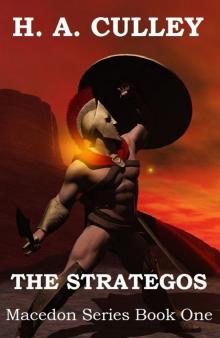 The Strategos
The Strategos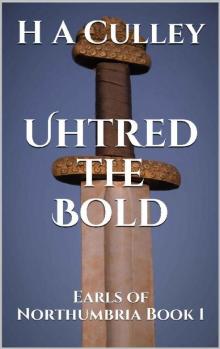 Uhtred the Bold
Uhtred the Bold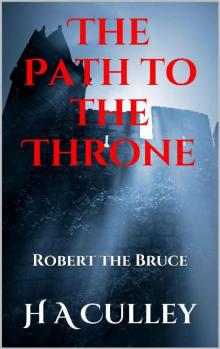 The Path to the Throne
The Path to the Throne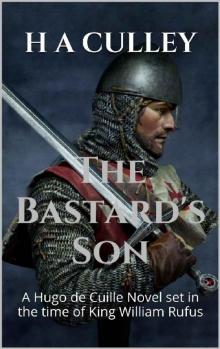 The Bastard's Son
The Bastard's Son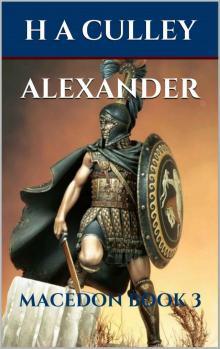 Alexander
Alexander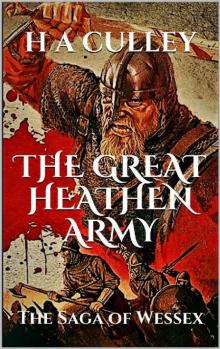 The Great Heathen Army
The Great Heathen Army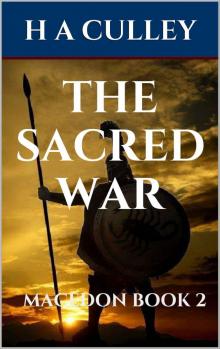 The Sacred War
The Sacred War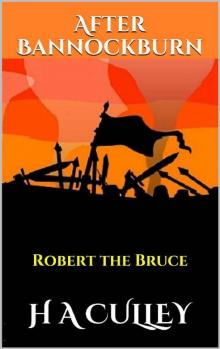 After Bannockburn
After Bannockburn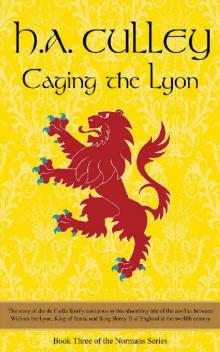 Caging the Lyon
Caging the Lyon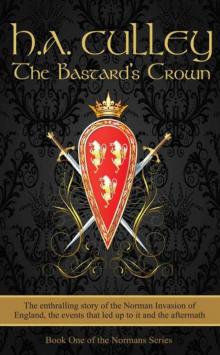 The Bastard's Crown
The Bastard's Crown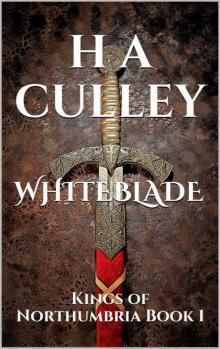 WHITEBLADE
WHITEBLADE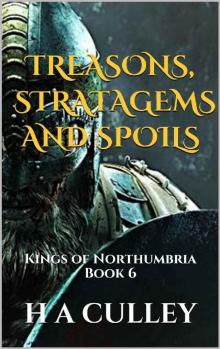 TREASONS, STRATAGEMS AND SPOILS: Kings of Northumbria Book 6
TREASONS, STRATAGEMS AND SPOILS: Kings of Northumbria Book 6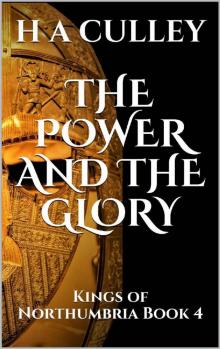 THE POWER AND THE GLORY: Kings of Northumbria Book 4
THE POWER AND THE GLORY: Kings of Northumbria Book 4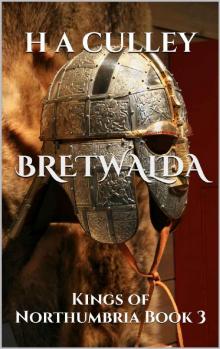 BRETWALDA: Kings of Northumbria Book 3
BRETWALDA: Kings of Northumbria Book 3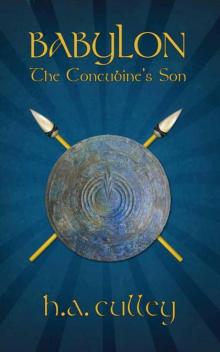 The Concubine's Son
The Concubine's Son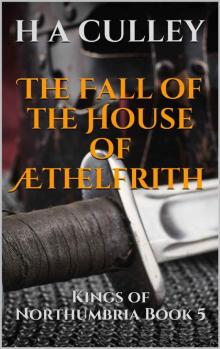 The Fall of the House of Æthelfrith: Kings of Northumbria Book 5
The Fall of the House of Æthelfrith: Kings of Northumbria Book 5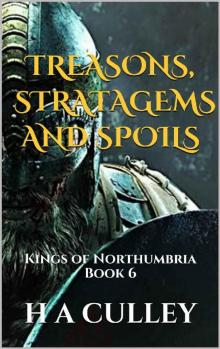 TREASONS, STRATAGEMS AND SPOILS
TREASONS, STRATAGEMS AND SPOILS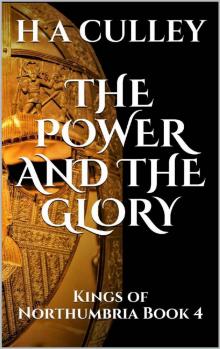 THE POWER AND THE GLORY
THE POWER AND THE GLORY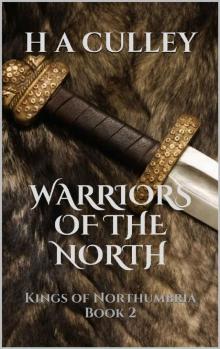 WARRIORS OF THE NORTH
WARRIORS OF THE NORTH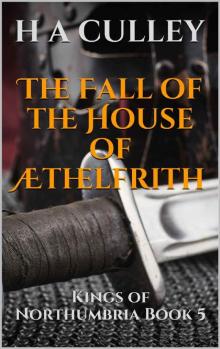 The Fall of the House of Æthelfrith
The Fall of the House of Æthelfrith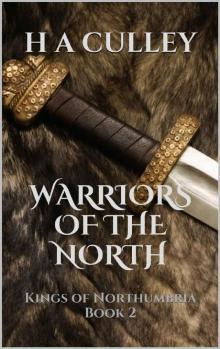 WARRIORS OF THE NORTH: Kings of Northumbria Book 2
WARRIORS OF THE NORTH: Kings of Northumbria Book 2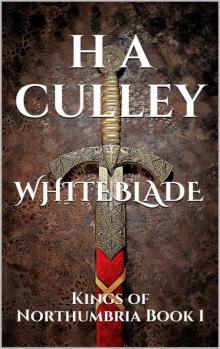 WHITEBLADE: Kings of Northumbria Book 1
WHITEBLADE: Kings of Northumbria Book 1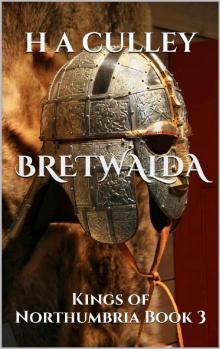 BRETWALDA
BRETWALDA